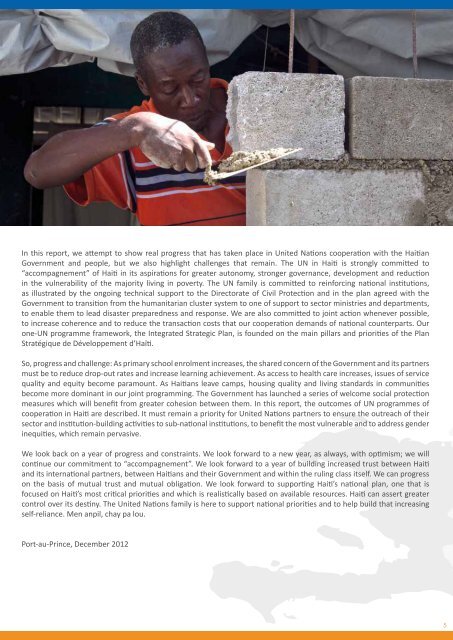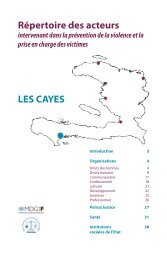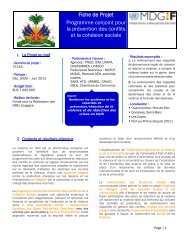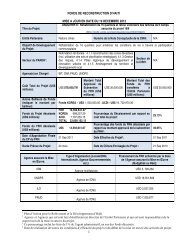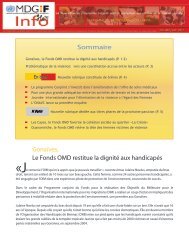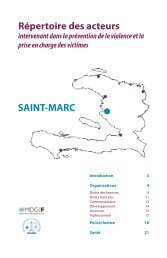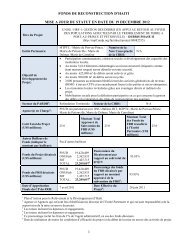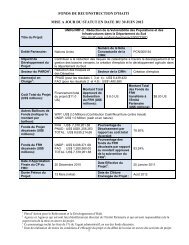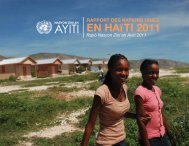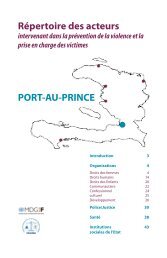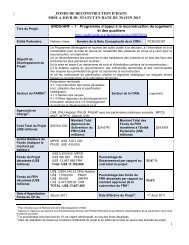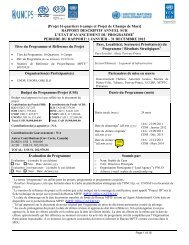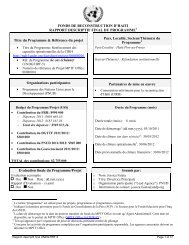HAITI MOVING FORWARD - ONU en Haiti
HAITI MOVING FORWARD - ONU en Haiti
HAITI MOVING FORWARD - ONU en Haiti
You also want an ePaper? Increase the reach of your titles
YUMPU automatically turns print PDFs into web optimized ePapers that Google loves.
In this report, we attempt to show real progress that has tak<strong>en</strong> place in United Nations cooperation with the <strong>Haiti</strong>anGovernm<strong>en</strong>t and people, but we also highlight chall<strong>en</strong>ges that remain. The UN in <strong>Haiti</strong> is strongly committed to“accompagnem<strong>en</strong>t” of <strong>Haiti</strong> in its aspirations for greater autonomy, stronger governance, developm<strong>en</strong>t and reductionin the vulnerability of the majority living in poverty. The UN family is committed to reinforcing national institutions,as illustrated by the ongoing technical support to the Directorate of Civil Protection and in the plan agreed with theGovernm<strong>en</strong>t to transition from the humanitarian cluster system to one of support to sector ministries and departm<strong>en</strong>ts,to <strong>en</strong>able them to lead disaster preparedness and response. We are also committed to joint action wh<strong>en</strong>ever possible,to increase coher<strong>en</strong>ce and to reduce the transaction costs that our cooperation demands of national counterparts. Ourone-UN programme framework, the Integrated Strategic Plan, is founded on the main pillars and priorities of the PlanStratégique de Développem<strong>en</strong>t d’Haïti.So, progress and chall<strong>en</strong>ge: As primary school <strong>en</strong>rolm<strong>en</strong>t increases, the shared concern of the Governm<strong>en</strong>t and its partnersmust be to reduce drop-out rates and increase learning achievem<strong>en</strong>t. As access to health care increases, issues of servicequality and equity become paramount. As <strong>Haiti</strong>ans leave camps, housing quality and living standards in communitiesbecome more dominant in our joint programming. The Governm<strong>en</strong>t has launched a series of welcome social protectionmeasures which will b<strong>en</strong>efit from greater cohesion betwe<strong>en</strong> them. In this report, the outcomes of UN programmes ofcooperation in <strong>Haiti</strong> are described. It must remain a priority for United Nations partners to <strong>en</strong>sure the outreach of theirsector and institution-building activities to sub-national institutions, to b<strong>en</strong>efit the most vulnerable and to address g<strong>en</strong>derinequities, which remain pervasive.We look back on a year of progress and constraints. We look forward to a new year, as always, with optimism; we willcontinue our commitm<strong>en</strong>t to “accompagnem<strong>en</strong>t”. We look forward to a year of building increased trust betwe<strong>en</strong> <strong>Haiti</strong>and its international partners, betwe<strong>en</strong> <strong>Haiti</strong>ans and their Governm<strong>en</strong>t and within the ruling class itself. We can progresson the basis of mutual trust and mutual obligation. We look forward to supporting <strong>Haiti</strong>’s national plan, one that isfocused on <strong>Haiti</strong>’s most critical priorities and which is realistically based on available resources. <strong>Haiti</strong> can assert greatercontrol over its destiny. The United Nations family is here to support national priorities and to help build that increasingself-reliance. M<strong>en</strong> anpil, chay pa lou.Port-au-Prince, December 20125


